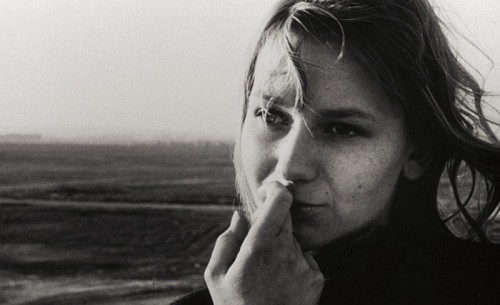
By Duane Porter
Nothing distinguishes memories from ordinary moments. It is only later that they claim remembrance. By their scars. — Chris Marker, La Jetée
.
Writer, editor, photographer, filmmaker, world traveler, archivist and multimedia/installation artist, unclassifiable and without boundaries. Born Christian-François Bouche-Villeneuve on 29 July 1921 at Neuilly-sur-Seine, an exclusive suburb of Paris, Chris Marker has sought to circumvent the expectations and limitations associated with background and class by choosing a name that might belong to anyone and that is easily pronounced anywhere. Working under various pseudonyms, avoiding interviews and photographs, and being somewhat evasive regarding his biography, Marker maintained a certain level of anonymity that has proved useful in his work. Beginning in January 1947, he published poems, short stories, and essays in the eclectic intellectual journal, Esprit. Also among his early works are one novel, Le Coeur net (1949), about airmail pilots in Indo-China after the war, and a critical monograph of playwright Jean Giraudoux (1952). He became increasingly interested in film, writing essays on Laurence Olivier’s Henry V, Cocteau’s Orphée, and Carl Dreyer’s La Passion de Jeanne d’Arc, among others. Having mastered the personal essay, inspired by a love for word and image, he ventured into filmmaking with Olympia 52 (1952), an account of the Helsinki Olympic Games. His second film was actually his first, begun two years before Olympia 52 but not finished until one year after, Statues Also Die (1953), co-directed with his friend, Alain Resnais. Being about African art and the effects of colonialism on traditional cultures, it was banned by the French government for its criticisms of colonialism and wasn’t seen in it’s entirety until 1968. Several distinctive essayistic travel documentaries followed, A Sunday in Peking (1956), Letter from Siberia (1958), Description of a Struggle (1960), and Cuba sí! (1961), firmly establishing his association with the essay film. Marker considers his work up to this time to be merely a rough draft, maintaining that his filmmaking career began in 1962 when he began work on Le jolie mai (1963), an intimate interrogatory account of Paris during May 1962 in the days following the close of the Algerian War. It was during breaks in the shooting for Le jolie mai that he made most of the photographs that make up La Jetée, a 27 minute post-apocalyptic love story made up almost entirely of black and white still photographs. A meditation on time and memory that is also a reflection on the nature of the photographic image. A photograph being a perception of immediate reality, an image of the present that instantly becomes the past, a photograph is always a memory.






















 Click on names for archives
Writers/Founders
Click on names for archives
Writers/Founders